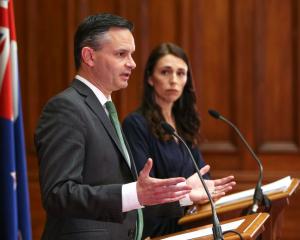
The election king-maker and leader of the New Zealand First party last week said he would prioritise a restructure of the forest industry in closely-watched coalition talks with major parties after last month's inconclusive election result.

The plan includes a possible quota system which would force growers to favour local mills over a higher-paying export market.
Exports of forest products totalled around $NZ4.75 billion in 2015, with China the top destination.
That has put the Pacific nation's lucrative forestry sector at the heart of concerns that New Zealand First in power will spell greater government intervention in New Zealand's small, outward facing economy.
"Every time the Government has done something like that we get what you call a hole in the supply of timber and we're going into a hole now, an undersupply," says Joe Carr, the owner of a privately-held logging business managing 500ha of forest in the far north of the country.
Mr Carr is holding off replanting 60ha of his land due to the possible restrictions and said on average growers were paid a third less to sell logs locally than to export them.
He said his son was re-thinking whether his family should stick to forestry after 44 years in the business.
FREE-MARKETEER
New Zealand's plantation forests, like much of the country's industry, were opened up to private investment in the early 1990s after sweeping economic reforms the previous decade.
Mr Peters' comments signal a stark change from New Zealand's role as a global test-bed for free market reforms since the 1980s.
The New Zealand First Party is also pushing for significant curbs on migration, restrictions on foreign ownership of land and favours more central bank intervention in the foreign exchange market.
Mr Peters, a consummate pragmatist, is considered unlikely to insist on his more radical ideas. He has served in governments with both the Labour and National parties in the past without major economic overhaul.
But the 72-year old is also looking to cement his legacy in what is likely to be his last major hold on power after 40 years in politics.
"Definitely, if he negotiates hard on some of these things, we could see a more interventionist approach than we have in the past," said Catherine Beard, head of industry association Business NZ.
MILLION-DOLLAR HIT
The idea is a quota-system would force more logs to be sold and processed locally, adding value to the $NZ270 billion economy.
The industry could process around 20% more than the current 8 million cubic metres each year with more reliable supply, said Kevin Hing, deputy director of the New Zealand Timber Industry Federation, which represents sawmillers.
"We recognise that log export is an option for many forest owners, but we don't want that to be at the expense of domestic processing," Mr Hing said.
Forestry owners say big companies already favour local processors and the proposals would have a disproportionate impact on small forest growers.
They worry the prospect of curbed earnings would lead growers to hold off planting, reducing the supply of logs.
"The unintended consequence of that, which I don't think Winston Peters has thought through, is that you actually devalue that asset and you chase investors away," said Peter Clark, CEO of forestry service firm PF Olsen Limited.
He said such quotas would knock hundreds of millions of New Zealand dollars off timber assets. New Zealand's privately-owned forests, mostly pinus radiata that grow much faster than in their native California, are worth NZ$25-NZ$30 billion.
'OPEN FOR BUSINESS'
Mr Peters has also said foreign ownership restrictions would be a large part of this week's negotiations talks.
He called the high concentration of foreign ownership "crazy" in an August speech on his plans for the forestry sector. Just over half of the country's forests are owned by offshore companies, according to the New Zealand Institute of Forestry.
"NZ First, in government, will seriously tighten up the ability of foreigners to buy our land," Mr Peters said August.
All of this is making some overseas investors nervous.
"They're saying if it gets much harder they think that their head office offshore will start looking at New Zealand ... and say: 'Do we, long term, want to continue investing in here or do we slowly start withdrawing?'," said Warwick Searle, the head of agribusiness at investment consultant CBRE.
An official for state-owned China Forestry Group, which owns about 22,000 hectares of New Zealand forest, said overseas ownership was already carefully regulated by the country's authorities and quotas would also make it harder to operate.












